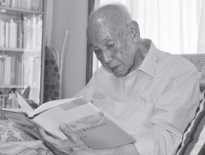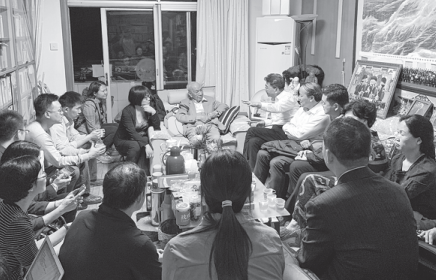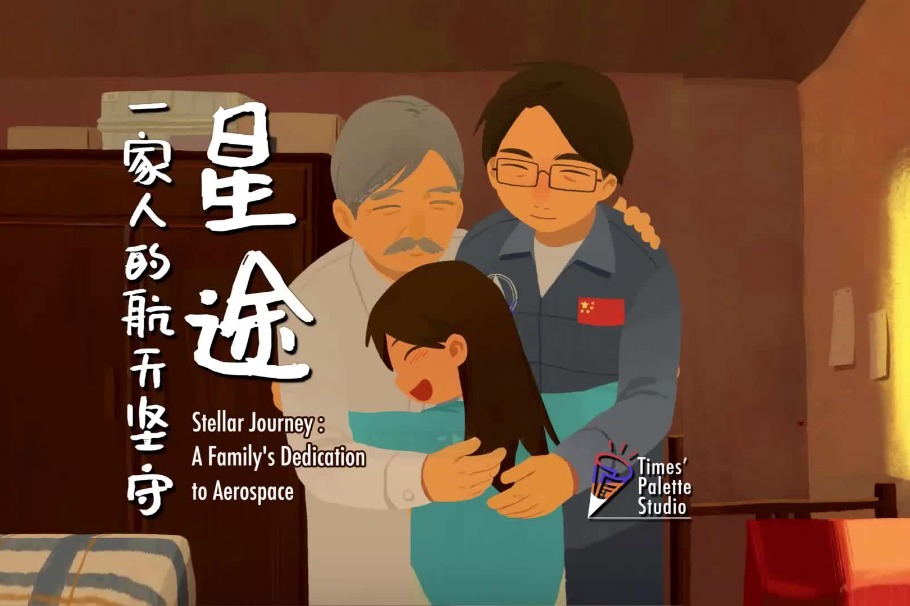Teacher, 100, in a true class of his own

XIAMEN-Pan Maoyuan is just like any other teacher at Xiamen University except for his age: He is 100.
"If I were to live life twice, I would still want to be a teacher," Pan said ahead of China's Teachers' Day that fell on Sept 10.
As one of the founders of China's higher education, Pan has nurtured 326 PhD candidates and 759 master's students in more than 40 years.
Pan was just 15 when he took up a part-time job as a teacher at a private primary school in the city of Jieyang, south China's Guangdong province.
"The students in my class were aged from 5 to 15. They were very naughty. When I turned to write on the blackboard, they threw chalk at each other. When I read from the textbook, they did not pay attention but talked and were disorderly," Pan recalls.
The frustrating experience of being a teacher did not hold him back. Instead, he was determined to overcome the odds and become a "real" teacher. "Failure is the mother of success," he told himself.
Pan entered a teachers' school, taking a lot of courses to qualify as a teacher. He was finally enrolled in Xiamen University in 1941 and chose education as a major.
During his college years, Pan revisited his teaching role by working part time in local primary schools. He allowed students to absorb nature's beauty outdoors rather than keeping them confined to the classroom to help inspire their essays. He also borrowed specimens from his university and took them to the zoology class.
"Pupils were always curious about what I would bring them. Many years later, one of them became a well-known marine biology specialist," he says.
With his vast teaching experience, Pan found fame in Xiamen, an eastern Chinese city where his university is located. However, he tasted failure again in the 1950s.
He was invited to share his teaching experience with the heads of several universities. "My teaching experience had to do mainly with pupils. They said they dealt with university students and what I said was impractical," he recalls.
Pan decided to fill the void of higher education knowledge on the Chinese mainland. In the following 50-odd years, Pan created many "firsts". He helped establish the first higher education research institution and compiled the first published monograph on higher education.
In the mid-1980s, Pan hosted a weekend academic salon every Saturday evening. He received his students at his apartment, discussing various topics, from education to the wider aspects of life.
"University is not only a place where you can gain knowledge but also a place that can nurture you silently with its academic atmosphere," Pan says.
For Pan, a quality teacher is a caring one who loves his or her students. His students often call or visit him, even after graduation.
Pan also believes that every student is equal. "Students may differ in abilities. Some may have the aptitude for vocational schools, while others may be suited to research at universities. All of them are absolutely necessary for society," he says.
Due to the COVID-19 epidemic, Pan gave his first ever online lecture in June. More than 30,000 teachers and students across China joined the one-hour class.
"I was not satisfied with the online lecture," he says. "Students could see me, but I could not see them. Eye contact is very important in communication and it is true for a class too."
Pan, the oldest working teacher at Xiamen University, celebrated his 100th birthday with his colleagues and students on Aug 4.
"The most gratifying thing in my life is that I am a teacher," Pan says. "As a teacher, you gain by giving away."
Xinhua


Today's Top News
- China's commitment to Asia-Pacific shared prosperity highlighted at APEC gatherings
- Xi extends congratulations to Egyptian president on Grand Egyptian Museum opening
- China protests Japan PM's meeting with Taiwan official at APEC
- First-ever cross-boundary torch relay held for National Games
- China lodges stern representations, strong protests with Japan over its wrong acts, remarks concerning Taiwan during APEC meeting
- New quality productive forces gather steam to turbocharge future growth






























